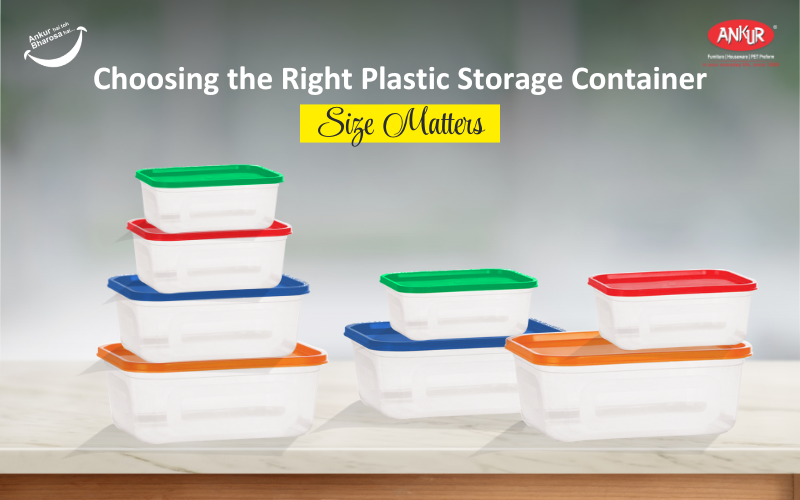Choosing the Right Plastic Storage Container: Size Matters

Plastic storage containers are indispensable tools for keeping our homes, offices, and businesses organized and clutter-free. Whether you’re storing seasonal decorations, household essentials, or inventory for your business, selecting the right plastic storage container is crucial. But with so many options available in the market, it can be overwhelming to find the perfect fit for your needs.
Introduction
Choosing the right plastic storage container is not just about picking any box off the shelf. It’s about understanding your specific storage needs and selecting a container that meets those requirements efficiently. From size and material to durability and cost, there are several factors to consider to ensure you make the right choice.
Understanding Your Needs
The first step in choosing the right plastic storage container is to assess your storage requirements. Consider the items you need to store, the available space, and how frequently you’ll need to access them. Are you storing bulky items like blankets and winter clothes, or smaller items like toys and office supplies? Understanding your needs will help you narrow down your options and make an informed decision.
Types of Plastic Storage Containers
Plastic storage containers come in various shapes and sizes, including bins, crates, and boxes. Each type has its own set of advantages and disadvantages. Bins offer easy access to your items and are stackable, making them ideal for organizing small items. Crates are sturdy and stackable, making them perfect for heavy-duty storage. Boxes are versatile and come in various sizes, but may not be as durable as bins or crates. Consider your storage needs and preferences when choosing the right type of container for you.
Material Matters
When it comes to plastic storage containers, the material matters. The most common types of plastics used in storage containers are polyethylene and polypropylene. Polyethylene containers are lightweight, durable, and resistant to chemicals and moisture, making them ideal for storing food items and household essentials. Polypropylene containers are more rigid and durable, making them suitable for heavy-duty storage and industrial applications. Consider the material properties and your storage needs when choosing the right plastic storage container for you.
Size and Capacity
One of the most important factors to consider when choosing a plastic storage container is size and capacity. Measure the space where you plan to place the container and consider how much stuff you need to store. Choosing a container that is too small will leave you with insufficient storage space, while choosing one that is too large will take up unnecessary space. Estimate the storage capacity you need and choose a container that meets those requirements efficiently.
Features to Consider
When choosing a plastic storage container, consider the features that are important to you. Look for containers with secure lids to keep your items safe and dust-free. Consider containers with handles and wheels for easy transport and mobility. Stackable and nesting containers are ideal for saving space when not in use. Consider your storage needs and preferences when choosing the right features for you.
Durability and Longevity
Durability is another important factor to consider when choosing a plastic storage container. Look for containers made from high-quality materials that are built to last. Consider factors such as UV resistance, impact resistance, and temperature resistance when choosing a container that will withstand the test of time. Proper maintenance and care will also help prolong the life of your plastic storage container.
Cost Considerations
While cost shouldn’t be the only factor when choosing a plastic storage container, it’s important to consider your budget. Balancing quality and cost will help you find the best value for your money. Remember that investing in a high-quality container may save you money in the long run by avoiding the need for frequent replacements. Consider your budget and storage needs when choosing the right container for you.
Environmental Impact
In addition to cost and durability, consider the environmental impact of the plastic storage container you choose. Look for containers made from recyclable materials and consider recycling options when disposing of old containers. Choosing eco-friendly containers will help reduce your carbon footprint and contribute to a healthier planet.
Choosing the Right Brand
When choosing a plastic storage container, it’s important to choose a reputable brand with a track record of quality and reliability. Look for brands with positive customer reviews and high ratings. Consider factors such as warranty and customer support when choosing the right brand for you.
Customization Options
Some plastic storage containers offer customization options, such as labeling and color choices. Consider your personalization preferences when choosing a container that reflects your style and personality. Some brands also offer custom sizes and configurations to meet your specific storage needs.
Where to Purchase
Plastic storage containers are available for purchase at retail stores and online retailers. Consider factors such as convenience, selection, and price when choosing where to buy your containers. Look for retailers that offer a wide range of options and competitive prices.
Maintenance and Care Tips
To ensure your plastic storage containers stay in good condition, follow these maintenance and care tips:
- Regularly clean and sanitize your containers to prevent mold and mildew buildup.
- Store your containers in a dry, cool place away from direct sunlight to prolong their lifespan.
- Avoid overloading your containers to prevent them from cracking or breaking.
Conclusion
Choosing the right plastic storage container is essential for keeping your space organized and clutter-free. Consider factors such as size, material, features, and cost when making your decision. By taking the time to assess your storage needs and preferences, you can find the perfect container that meets your requirements efficiently.
